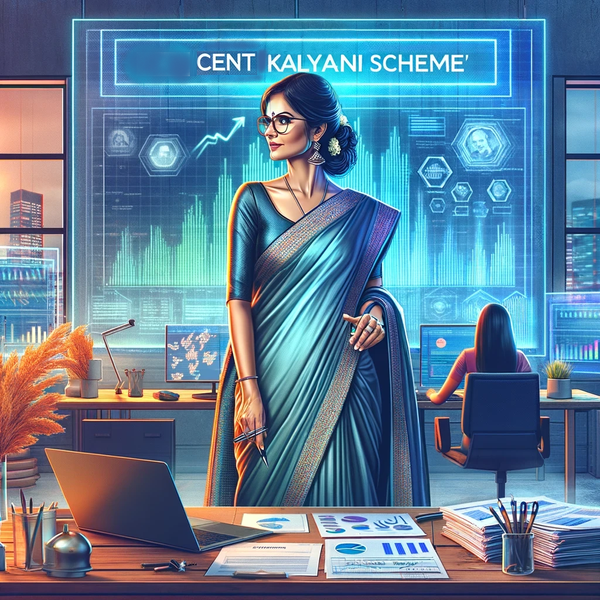From Dreams to Reality: How Government Loan Schemes are Changing Indian MSMEs

The Government of India is always eager to support and encourage Micro, Small, and Medium Enterprises (MSMEs) to expand and achieve significant success. The reason is simple; small businesses and MSMEs fuel India's growth and development. Even though the term 'Micro and Small' is part of the MSME definition, their contribution to India's current status is immense.
Did you know? Currently, there are 6.5 crore registered MSMEs in India, employing 11 crore Indians, and contributing approximately 30% to India's GDP. As of March 2020, micro, small, and medium enterprises contributed 45% of India's total manufacturing output. MSMEs across various sectors account for 40% of India's exports. Their contribution to India's business ecosystem surpasses any other sector, and their growth trajectory continues to rise.
The Indian Government has introduced several loan schemes for MSMEs to aid and empower them. The main objective of these loans is to financially strengthen MSMEs, enabling them to generate more business, create additional jobs, and further contribute to the Indian economy.
If your MSME in India is facing challenges, fret not. There are multiple government loan schemes tailored for MSMEs and startups to guide you.
Here are 5 Government Loan Schemes for MSMEs:
1. SIDBI Launches MSME Loan in 59 Minutes
The MSME loan, introduced by SIDBI or the Small Industries Development Bank of India, is a unique government loan scheme for MSMEs and new businesses. This scheme promises a loan approval in just 59 minutes. After the loan gets approved, it takes 8-9 days for the disbursement process to be completed.
Small and medium-sized enterprises (SMEs) and micro, small, and medium-sized enterprises (MSMEs) can avail loans of up to Rs 10 crore through refinance schemes offered by five nationalized (PSU) banks. The interest rate for this loan is determined by the specifics of the business, the owner's current credit rating, and the loan duration.
To learn more about the 59-minute loan (its eligibility criteria, documents required, and application process) click here.
2. MUDRA Loan Schemes for MSMEs
The Micro-units Development and Refinance Agency (MUDRA) represents a unique government loan scheme designed to support non-corporate, non-farm small/micro-enterprises.
MUDRA was f Established in 2015, MUDRA's aim is to 'finance the unfunded' MSMEs. Under the Pradhan Mantri MUDRA Yojana (PMMY), loans amounting to more than Rs 40,000 crore have been disbursed as of August 2020.
MUDRA offers loans categorized into three groups:
- Shishu: For budding entrepreneurs and MSMEs, offering loans up to Rs 50,000.
- Kishor: For growing MSMEs and startups, with loans up to Rs 5,00,000.
- Tarun: For established MSMEs and startups, offering loans up to Rs 10,00,000.
This loan scheme best fits businesses that are just starting out and need a significant capital boost.
To learn more about the MUDRA loan (its eligibility criteria, documents required, and application process) click here
3. Micro and Small Enterprise Credit Guarantee Fund Scheme (CGTMSE)
The Ministry of Micro, Small, and Medium Enterprises (MSME Ministry) and the Small Industries Development Bank of India (SIDBI) launched it. The Capital Guarantee Fund Scheme for Micro and Small Enterprises, or CGTMSE Scheme, offers loans to small businesses and enterprises without the need for collateral.
Under this scheme, both new and existing enterprises can secure collateral-free loans up to Rs 10 lakh. However, for loans exceeding Rs 10 lakh and up to Rs 1 crore, MSMEs can provide primary security or a lease on land and buildings related to the business for loans of more than Rs 10 lakh and up to Rs 1 crore, which is again covered by Credit Guarantee Fund Trust for Micro and Small Enterprises (CGTMSE). As a result, assets developed by the business leveraging the credit line are considered as collateral for loans up to Rs 1 crore.
Who is Eligible to Apply?
Businesses possessing tangible assets like real estate and machinery are the greatest candidates for the Government of India's CGTMSE plan. Because loans of as much as Rs 1 crore can be obtained by mortgaging, firms can use their existing assets to expand/improve their operations.
To learn more about the CTGMSE loan (its eligibility criteria, documents required, and application process) click here.
4. National Small Industries Corporation (NSIC) Credit Facilitation Through Bank
The Credit Facilitation Through Bank scheme, initiated by the Ministry of Micro, Small, and Medium Enterprises (MSME), is a one-of-a-kind loan facility offered by The National Small Industries Corporation (NSIC) under Central Government Schemes.
Under this plan, NSIC has inked Memorandums of Understanding (MOUs) with numerous private and public sector banks to provide rapid, simple, and special-purpose loans to MSMEs in India. NSIC also assists MSMEs and small enterprises in completing documents and meeting all legal requirements.
The MoU between the National Small Industries Corporation and banks encompasses major institutions like ICICI Bank, HDFC Bank, Axis Bank, YES Bank, and others.
Who Should Submit an Application?
Small businesses seeking quick, short-term loans to enhance and grow their operations can take advantage of this unique government program and obtain low-interest loans directly from banks. Because the government assists them with documentation and legal concerns, obtaining loans under this government loan scheme is simple.
To learn more about the NSIC loan (its eligibility criteria, documents required, and application process) click here.
5. Technology Upgrade Credit Link Capital Subsidy Scheme (CLCSS)
Under the Credit Link Capital Subsidy Scheme (CLCSS) for Technology Upgradation, the Government of India and the Ministry of Micro, Small, and Medium Enterprises (MSME) provide loans and credits to small businesses.
As the name suggests, this government initiative aims to facilitate MSMEs in swiftly adapting to the newest innovations and remain competitive in domestic and worldwide markets. Loans up to Rs 15 lakh are available to enable MSMEs to employ cutting-edge technology, with a 15% subsidy on total upkeep costs.
Who Should Submit an Application?
This Central Government Loan Scheme offers a great opportunity for manufacturing organizations, fabricating units, textile startups, and small businesses that use machines and equipment to improve and adapt to the latest technologies.
To learn more about the CLCSS loan (its eligibility criteria, documents required, and application process) click here.
Conclusion:
Curious about the best government loan Schemes for MSMEs and startups? Consult experts on government funding schemes for MSMEs and small firms at Acehours, which offers a one-of-a-kind platform for finding the greatest and most knowledgeable business counselors and consultants.




